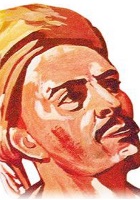Yunus Emre Biography
Yunus Emre (1240?–1321?) was a Turkish poet and Sufi mystic. He has exercised immense influence on Turkish literature, from his own day until the present. Because Yunus Emre is, after Ahmet Yesevi and Sultan Veled, one of the first known Turkish poets to have composed works in the spoken Turkish of his own age and region rather than in Persian or Arabic, his diction remains very close to the popular speech of his contemporaries in Central and Western Anatolia. This is also the language of a number of anonymous folk-poets, folk-songs, fairy tales, riddles (tekerlemeler), and proverbs.
Like the Oghuz language Book of Dede Korkut, an older and anonymous Central Asian epic, the Turkish folklore that inspired Yunus Emre in his occasional use of tekerlemeler as a poetic device had been handed down orally to him and his contemporaries. This strictly oral tradition continued for a long while.
Following the Mongolian invasion of Anatolia facilitated by the Seljuk Turkish defeat at the 1243 Karaman, Islamic mystic literature thrived in Anatolia, and Yunus Emre became one of its most distinguished poets. Poems of Sultan Yunu Emre — despite being fairly simple on the surface — evidence his skill in describing quite abstruse mystical concepts in a clear way. He remains a popular figure in a number of countries, stretching from Azerbaijan to the Balkans, with seven different and widely dispersed localities disputing the privilege of having his tomb within their boundaries.
His poems, written in the tradition of Anatolian folk poetry, mainly concern divine love as well as human destiny
Let's say the name of Allah all the time.
Let's see what my Lord does.
Let's travel the Way always.
Let's see what my Lord does.
...
Cana cefa kıl ya vefa
Kahrın da hoş, lutfun da hoş,
Ya derd gönder ya deva,
Kahrında hoş, lutfun da hoş.
...
Ask those who know,
what's this soul within the flesh?
Reality's own power.
What blood fills these veins?
...
Knowledge should mean a full grasp of knowledge:
Knowledge means to know yourself, heart and soul.
If you have failed to understand yourself,
...
If I told you about a land of love,
friend, would you follow me and come?
In that land are vineyards
...
